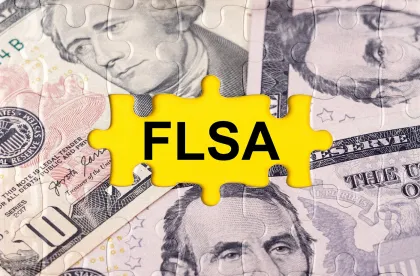A federal district court located within the jurisdiction of the U.S. Court of Appeals for the Fourth Circuit has adopted the heightened standard for certification of a collective action under the Fair Labor Standards Act (FLSA) established in a 2021 landmark opinion by the U.S. Court of Appeals for the Fifth Circuit. Mathews v. USA Today Sports Media Group, LLC, No. 1:22-cv-1407 (E.D. Va. Apr. 14, 2023).
The court rejected the traditional two-stage “conditional certification” framework, which often has been applied as a minimal standard in the first stage of certification.
Traditional Two-Stage Framework
The two-stage conditional certification approach was introduced in Lusardi v. Xerox Corp., 99 F.R.D. 89 (D.N.J. 1983). Lusardi involved a collective action under the Age Discrimination in Employment Act, which uses the same collective action mechanism as under the FLSA (29 U.S.C. § 216(b)). That court granted conditional certification without first making a determination of whether the putative class members were indeed “similarly situated,” as required under Section 216(b). Instead, the Lusardi court initially allowed notice to be sent to putative similarly situated class members, as the court “anticipated a final decision on class certification” would come after pretrial discovery. See Lusardi v. Xerox Corp., 118 F.R.D. 351, 361 (D.N.J. 1987). Following discovery, the court decertified the class, finding the evidence showed “disparate factual and employment settings” and, thus, insufficient similarity among the plaintiffs to move forward as a class claim.
Under the Lusardi approach, courts conditionally certify a collective action merely upon a minimal showing by plaintiffs that the potential members of the collective are similarly situated. A plaintiff’s burden at the conditional certification stage often is modest: the first step generally involves only an analysis of a plaintiff’s allegations. The low bar applied to conditional certification often means plaintiffs obtain conditional certification with minimal or no pretrial discovery. Consequently, courts routinely grant conditional certification in the large majority of FLSA cases. In doing so, courts authorize dissemination of notice of the collective action to potential class members.
Notwithstanding a defendant’s opportunity to subsequently decertify a collective action, there are significant ramifications to the granting of conditional certification, including:
-
The court orders the employer to produce to plaintiffs’ counsel a list of all putative members of the collective with their contact information; and
-
The court orders notice to be disseminated to all putative collective members.
In its 1989 decision, the U.S. Supreme Court cautioned that, while a district court may facilitate notice to potential opt-in plaintiffs as part of the court’s responsibility to manage a collective action, this function is not intended to be a mechanism to “solicit” additional claims. Hoffmann-La Roche Inc. v. Sperling, 493 U.S. 165, 174. However, the Supreme Court stopped short of offering meaningful guidance on the standard that district courts should apply when deciding whether to grant conditional certification and, thus, whether such notice should issue. Lusardi and its progeny have largely filled this vacuum.
Fifth Circuit Rejects Two-Stage Framework
In Swales v. KLLM Transport Services, LLC, the Fifth Circuit altered the course of FLSA litigation in federal courts in Louisiana, Mississippi, and Texas when it expressly rejected the two-stage conditional certification-followed-by-decertification approach. 985 F.3d 430 (2021). Instead, the appeals court held that, to determine whether plaintiffs meet the “similarly situated” standard, district courts must review the factual record developed by the parties before notice goes out to potential opt-in plaintiffs. The Fifth Circuit observed that the entire construct of “conditional certification” is not rooted in the text of the FLSA, which “says nothing about ‘conditional certification.’” It further noted that “the Lusardi test comes in many varieties,” with nonuniform application throughout the judicial system. The Fifth Circuit thus rejected the two-stage approach allowing for conditional certification of a collective and notice to be disseminated to putative collective members.
Impact of Swales
The effect in the Fifth Circuit decision was immediate. Days before the Fifth Circuit decision was released, in a January 8, 2021, decision, a federal court in Texas granted conditional certification in part in a minimum wage collective action against a restaurant chain. Eltayeb v. Deli Mgmt., 2021 U.S. Dist. LEXIS 3484 (E.D. Tex.). Four days later, the Swales decision was released, and the defendant in the Eltayeb case promptly filed a motion for reconsideration of the court’s certification decision in light of Swales. Concluding that its previous order “no longer comports with Fifth Circuit law,” the district court vacated its order. “Only after considering the evidence presented after the limited discovery period will the Court ‘rigorously scrutinize’” whether the workers are similarly situated, the court said. Later, after limited discovery, the court denied the plaintiff’s renewed motion to certify the collective and refused to authorize notice to potential class members.
In another post-Swales case, alleging unlawful deductions for uniform costs and an improper tip pool (among other claims), a federal court refused to certify a collective and denied plaintiffs’ motion to authorize notice. Helgason v. Perry’s Rests., Ltd., 2021 U.S. Dist. LEXIS 218134, at *8 (N.D. Tex. 2021). The plaintiffs submitted declarations describing “conversations with other co-workers” who allegedly said the tip pool was distributed to individuals who did not work the particular shift. The plaintiffs also presented paystubs reflecting uniform deductions from just two servers. The court found that, under the heightened Swales certification standard, the plaintiffs’ showing was insufficient to certify a collective. In contrast, in Lusardi regimes, declarations alone are commonly sufficient for plaintiffs to obtain conditional certification.
In Lusardi regimes, courts often have conditionally certified collective actions based on employees’ evidence — even if directly contradicted by an employer’s evidence. However, Swales requires a more rigorous vetting of the employees’ evidence versus the employer’s. In a post-Swales case involving claims of exemption misclassification, for example, the defendant-employer was able to introduce employee declarations early to rebut the plaintiff’s declaration regarding nonexempt work that he and others allegedly performed. The incongruity between the opposing sides’ declarations, presented to the court pre-certification, resulted in a denial of class certification. McCain v. Wireline, L.P., 2023 U.S. Dist. LEXIS 2329 (S.D. Tex. 2023).
Federal Courts Outside Fifth Circuit Adopt Swales
In Mathews, a federal court in Virginia followed Swales, chipping away at the two-step framework for conditional certification in the Fourth Circuit. The district court pronounced that “the Fifth Circuit’s approach is the better one” and denied plaintiffs’ motion for conditional certification. The district court pointed out the problem at the core of the conditional certification framework: “[The] FLSA’s text does not authorize courts sending notice to those who are not ‘similarly situated.’” Yet, the low burden on conditional certification under Lusardi means that notice inevitably will go out to some individuals who, in fact, are not similarly situated. “The Lusardi framework is therefore flawed,” the district court said.
Mathews sets up a district court split within the Fourth Circuit, where numerous courts have expressly declined to follow Swales and have continued to apply the Lusardi two-step conditional certification framework. In Thomas v. Maximus, Inc., the district court opted to continue to apply Lusardi “in light of the refusal of multiple district courts within the Fourth Circuit to apply Swales, and in the absence of guidance from the Supreme Court or the Fourth Circuit on the issue.” 2022 U.S. Dist. LEXIS 84827 (E.D. Va. 2022). The district court subsequently certified the question for interlocutory appeal; however, the Fourth Circuit denied the petition. Maximus, Inc. v. Thomas, 2022 U.S. App. LEXIS 21385 (4th Cir. Aug. 2, 2022).
Elsewhere, courts outside the Fifth Circuit have found Swales persuasive, as well, and have applied its reasoning to narrow a proposed collective or to deny certification outright. For example, a district court in Alabama (which sits in the Eleventh Circuit) abandoned the two-step framework. Broome v. CRST Malone, Inc., 2022 U.S. Dist. LEXIS 11329 (N.D. Ala. Jan. 21, 2022). Applying Swales, the court authorized notice to a narrower subset of employees than proposed by the plaintiffs. District courts within the Eleventh Circuit also are divided, however. In another case, a judge in the same district court acknowledged the Broome decision, but he noted that few courts outside the Fifth Circuit have adopted the reasoning of Swales and declined to do so in the case at hand. Manasco v. Best in Town, Inc., 2022 U.S. Dist. LEXIS 47609 (N.D. Ala. Mar. 17, 2022).
Is Sixth Circuit Next?
The Sixth Circuit Court of Appeals (which has jurisdiction over Kentucky, Michigan, Ohio, and Tennessee) is also reviewing the continued viability of Lusardi’s two-stage approach. Pending there is Clark v. A&L Home Care and Training Center, LLC (Nos. 22-3101/02), an interlocutory appeal challenging the conditional certification of two collective actions under the two-stage rubric. The appeals court heard oral argument in December 2022.
So far, district courts within the Eighth and Tenth Circuits, after granting plaintiffs’ motions for conditional certification, have denied employers’ requests to certify interlocutory appeals on the question of whether to apply the Swales standard.
Conclusion
The effect of Swales in the Fifth Circuit has been significant, and its potential reach beyond the jurisdiction is growing. With the district court split that Mathews created, the Fourth Circuit may be more inclined to take up the question of whether to reject the traditional two-stage framework. Meanwhile, a decision from the Sixth Circuit is imminent. If the Sixth Circuit follows Swales, employers operating in that jurisdiction will likewise have an earlier opportunity to present evidence of dissimilarity and, thus, ensure that individuals who are not similarly situated do not improperly receive notice of the pending action.
On the other hand, a contrary decision from the Sixth Circuit would set up a circuit split and potentially tee up for consideration by the U.S. Supreme Court the wisdom of “conditional” certification — a framework not found in the text of the FLSA but which has been applied by courts for decades. Clear guidance from the Supreme Court on the appropriate standard for conditional certification is long overdue.
While employers must still be wary of the impact of the collective action mechanism, a shifting tide in the rigor of the certification standard may allow employers more room to contest motions for collective certification.







 />i
/>i

